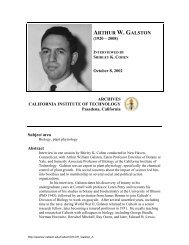Interview with Thomas A. Tombrello - Caltech Oral Histories
Interview with Thomas A. Tombrello - Caltech Oral Histories
Interview with Thomas A. Tombrello - Caltech Oral Histories
You also want an ePaper? Increase the reach of your titles
YUMPU automatically turns print PDFs into web optimized ePapers that Google loves.
<strong>Tombrello</strong>–12<br />
done very well at that—as well as he had done at the mines. He was the only uncle whose mine<br />
didn’t get unionized by the United Mine Workers, and nobody quite knows how and nobody ever<br />
asked. I’d always jokingly say, “It’s hard to find a union organizer if he’s under a thousand tons<br />
of rock.” [Laughter] I don’t know that anything like that happened. But for some reason Uncle<br />
Joe never got unionized and always made a lot of money. My Uncle Sam got unionized<br />
immediately, because he always met union activity head-on <strong>with</strong> “Nobody is going to unionize<br />
my mines.” John L. Lewis got him very easily.<br />
ASPATURIAN: John L. Lewis was quite a force of nature.<br />
TOMBRELLO: Absolutely. But my Uncle Sam figured, “You know, the price of coal is dropping.<br />
I could make this more efficient. I can use better technology. I can make money at $5 a ton.”<br />
The answer is, All you can do is lose a lot of money at $5 a ton. And he did.<br />
I had one uncle who had been in the war. Well, he’d been a quartermaster. Well, no. He<br />
had been a kind of gofer for a colonel or maybe a general—a fixer. Uncle Frank. He had one<br />
eye—another childhood-accident case, like my father. They each had lost an eye in a childhood<br />
accident. Uncle Frank was showing off for this teenage girl he had married—my Aunt Isabel—<br />
and he enlisted! He spent the war finding cases of Scotch and that kind of thing for his colonel<br />
or general. But then he comes back, and the coal thing is over. He hasn’t started any new<br />
businesses, and so he flails around for a couple of years, trying to raise peanuts, trying to do a<br />
variety of things. None of them work. Then he looked around at the rights-of-way under power<br />
lines—you know, the land under them, which has clearly been bought or leased—and he realized<br />
that a lot of stuff had grown up there during the war and that it hadn’t been cleared. He hired a<br />
bunch of unemployed teenagers who previously would have worked in the mines. And so <strong>with</strong><br />
primitive tools—hand tools—they went out and took contracts to clear the rights-of-way.<br />
Brilliant, opportunistic business. As he made money, he began to invest in equipment.<br />
Eventually, he took on other projects, like roads and dams and that sort of thing. Very successful<br />
at business, and it all started from a bunch of kids out there <strong>with</strong> bush hooks, killing rattlesnakes<br />
and chopping down trees and hauling them off. It was an interesting story.<br />
I still see one of my first cousins, who is about the age of my oldest child. She was on<br />
the punk-rock circuit—she’s an interesting lady, too—and we talk about Uncle Frank. He was<br />
http://resolver.caltech.edu/<strong>Caltech</strong>OH:OH_<strong>Tombrello</strong>_T

















